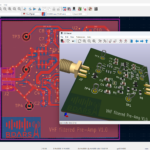🔧 Innovation at the Heart of Amateur Radio
Amateur radio has long been a playground for technical innovation. Many of the technologies we take for granted in modern communications were pioneered by radio amateurs experimenting in their own homes and workshops. A prime example is Single Sideband (SSB) modulation—a more efficient voice transmission method that originated in amateur circles and is now widely used in aviation, marine, and military communications.
Today, amateurs continue to push boundaries with digital modes, software-defined radios (SDR), mesh networking, and even Low-Earth Orbit Satellites. At BDARS, we celebrate and support this spirit of experimentation, offering a community where tinkerers, builders, and curious minds can thrive.
📡 Emergency Communications and Community Service
Amateur radio plays a vital role in emergency communications, especially during natural disasters when conventional systems fail. Licensed operators provide backup communications for emergency services and community organisations through groups like WICEN. These efforts demonstrate the value of amateur radio as a resilient and independent communication resource, helping to justify the continued allocation of radio spectrum to the amateur service.
🎓 Education and Skill Development
Amateur radio is a fantastic way to learn about electronics, physics, and communication theory. It’s also a great platform for developing practical skills in soldering, programming, and troubleshooting. Like BDARS, many clubs and individuals offer training and mentoring to help newcomers get licensed and build confidence. The WIA and RASA our national representitive organisations provide resources, exam support, and advocacy to help Australians get involved and stay active in the hobby.
🌍 Global Connections and Advocacy
Amateur radio is a truly global activity. Operators can connect with others across the world using voice, Morse code, or digital modes. International cooperation is essential to protect the frequencies we use, and organisations like the International Amateur Radio Union (IARU) work with the International Telecommunication Union (ITU) to represent amateur interests. In Australia, the WIA and RASA advocate for spectrum protection and regulatory fairness, ensuring that amateurs continue to have access to the airwaves.
✅ Responsible Operation and Licensing
Amateur radio is a licensed activity governed by the Australian Communications and Media Authority (ACMA). Operators are expected to follow technical and ethical standards, avoid interference, and use the spectrum responsibly. This commitment to professionalism helps maintain the hobby’s reputation and ensures continued support from regulators. Getting licensed is straightforward, and there are multiple levels to suit different interests and skill levels.
🚀 Beyond the Basics
It includes satellite communications, moonbounce (EME), high-altitude ballooning, contesting, and portable field operations. Whether you’re interested in building gear, chasing DX, or experimenting with propagation, there’s always something new to explore. The hobby offers endless opportunities for learning, adventure and beyond…



